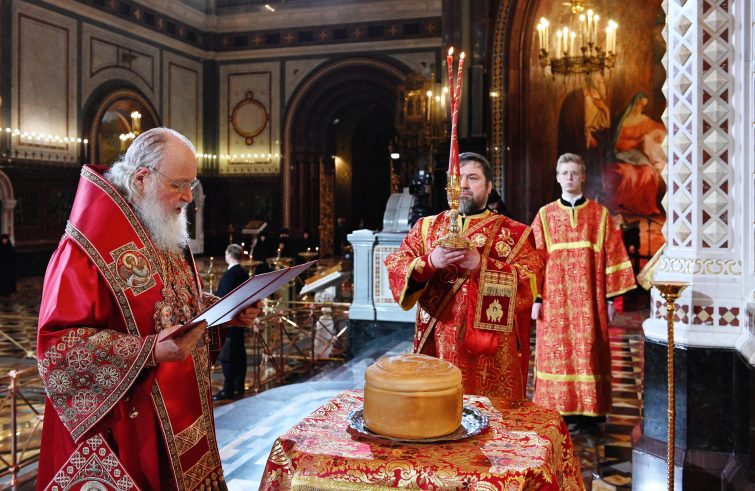
 Russia. Mons. Pezzi (Mosca): “Pasqua ortodossa a porte chiuse in risposta agli appelli del Patriarca Kirill”This year Russia observed Orthodox Easter amid lockdown. In Moscow and in its surrounding districts religious services – which according to the Julian calendar fall later than in the Western Catholic world – were celebrated behind closed doors. Here too, the Church has recommended that the faithful follow the liturgies broadcast live on television. Only one case of Covid-19 had been reported a month ago, but in the last few days the Country registered a sharp rise in infections. A total of 4.26 new cases of infection were confirmed in the last 24 hours, bringing the total number of infections to 47,121. The total death toll is 361. Most cases of Coronavirus were recorded in the Russian capital. Eight thousand patients are currently being treated in the various hospitals. Vitalij Gusarov, head physician of National Pirogov medical center, one of the many hospitals turned into an emergency medical facility, told the BBC Russian Service that it has almost reached its maximum capacity. “If this trend continues, we will no longer be able to handle the situation.” “Measures have been tightened since last Wednesday”, the Archbishop of Moscow, Msgr. Paolo Pezzi, told SIR. The city’s Mayor, Sergei Sobjanin, announced mandatory digital permits to travel on public and personal transport. The Catholic Church took advance measures and the last public celebration was held on the fourth Sunday of Lent, March 23. “Since then we held the celebrations online while in the churches there remained the possibility of praying, confessing and receiving communion in compliance with safety regulations.”
Russia. Mons. Pezzi (Mosca): “Pasqua ortodossa a porte chiuse in risposta agli appelli del Patriarca Kirill”This year Russia observed Orthodox Easter amid lockdown. In Moscow and in its surrounding districts religious services – which according to the Julian calendar fall later than in the Western Catholic world – were celebrated behind closed doors. Here too, the Church has recommended that the faithful follow the liturgies broadcast live on television. Only one case of Covid-19 had been reported a month ago, but in the last few days the Country registered a sharp rise in infections. A total of 4.26 new cases of infection were confirmed in the last 24 hours, bringing the total number of infections to 47,121. The total death toll is 361. Most cases of Coronavirus were recorded in the Russian capital. Eight thousand patients are currently being treated in the various hospitals. Vitalij Gusarov, head physician of National Pirogov medical center, one of the many hospitals turned into an emergency medical facility, told the BBC Russian Service that it has almost reached its maximum capacity. “If this trend continues, we will no longer be able to handle the situation.” “Measures have been tightened since last Wednesday”, the Archbishop of Moscow, Msgr. Paolo Pezzi, told SIR. The city’s Mayor, Sergei Sobjanin, announced mandatory digital permits to travel on public and personal transport. The Catholic Church took advance measures and the last public celebration was held on the fourth Sunday of Lent, March 23. “Since then we held the celebrations online while in the churches there remained the possibility of praying, confessing and receiving communion in compliance with safety regulations.”
Monsignor Pezzi, how was Easter?
It was an “Easter in the Church in the family” and it was very touching. Many young people wrote to me, sent me photos. I was impressed by the seriousness with which, given the present conditions, they put their lives before the mystery of the Risen Christ. I also took the initiative to impart an evening blessing to families every day, always via the Internet, through the YouTube channel. The present circumstances have also resulted in proximity, an intense dialogue between the pastor and the people. In addition, we use the Zoom platform for the meetings. We managed to restart catechesis, preparing the young for Confirmation.
At the morning Mass in Santa Marta, in his homily, the Pope called on priests and bishops to be cautious about the risk of virtualizing the Church, inviting them to live this moment as provisional, “to exit the tunnel, not to remain there.”
I strongly agree with the Pope. As bishops of the Russian Federation, we have tackled this aspect and we have reached three “conclusions in progress”, as I may define them. The first is that
It is necessary to understand and accept that this is a circumstance, not the ideal condition.
We took the example of the Jewish people in exile in Babylon: they were not in an ideal situation but given the circumstances, they could neither dream nor plan a return to normality, that is, to Jerusalem. They could only live that moment and be creative in living it. The second reflection is that this circumstance can become an opportunity to rediscover the value of the family, of prayer and dialogue in the family, of listening to the Word of God, in humbleness at home. And finally – the third reflection – to be aware that while on the one hand we are seeing increased generosity and openness to God’s plan, it is also true that living together at home is difficult, at times unbearable, for some people this is due to isolation and loneliness. For this reason we have suggested that priests call their parishioners by phone and meet via zoom, that is, let them feel that they are not alone.
How will this affect us once it’s over?
This time is the time to discern, to have the courage to make choices, to rediscover what is essential, what gives meaning to life. To rediscover that there is more joy in giving than in receiving. This is my wish but also my hope: if this time will usher in a greater civilization of truth and love, then we will not have spent it in vain.
If not, we will either be left with regret for what we could have done and did not do, or with sadness.
Also the Orthodox Easter was celebrated behind closed doors. Which climate do you perceive?
I found great elasticity in the Orthodox Church, the Patriarch and the other Metropolitans; a realistic concern for reality along with the ability to adapt to the changing circumstances.
Orthodox faithful clearly miss going to church these days but the Patriarch’s heartfelt appeals were very well received. Drawing on the example and the lives of some saints, he explained to his faithful that it is necessary to live out the faith, and therefore also Easter, not as it always was, or as we wish, but as the historical circumstances require, since those are the paths through which Christ encounters us today.”











